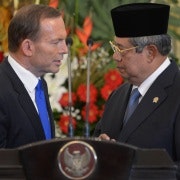In Victoria, Julie Bishop is the popular face of an unpopular government
The Conversation
During Thursday's extremely unruly question time, when Speaker Bronwyn Bishop ejected a record 18 (all Labor) members, Tony Abbott was asked whether he'd visit Victoria on Friday, the eve of the state election.
Abbott avoided the question, just talking about his earlier forays -- one of which saw that awkward body language with Denis Napthine. The last thing the embattled Premier needs is a repeat embrace from Abbott.
But Foreign Minister Julie Bishop is another matter. She'll be campaigning on Friday with Napthine. They'll appear in Bentleigh -- a key Liberal marginal seat on a swing of under 1 per cent. Ahead of that, Bishop will do a street walk in Mordialloc. The federal government is on the nose, but Bishop is seen as a positive.
The state government has made its own trouble but its problems have been exacerbated by Canberra. Apart from the unpopularity of the budget in May, the introduction by regulation of fuel excise indexation, which started from November 10, and Abbott's canvassing of possible changes to the GST, were unhelpful. One federal issue coming through in Liberal focus groups has been the plan to deregulate university fees. State Liberal messages have also tended to get knocked out by federal stuff ups.
Now we have had what can only be described as a shocker week for the Feds, which included the continuing row about cuts to the ABC and SBS and the fracas over Defence Minister David Johnston's outburst against the Australian Submarine Corporation.
From the Victorian government's point of view, the most damaging federal issue this week has surely been the extraordinary contortions over the proposed Medicare $7 co-payment.
After prime ministerial sources on Wednesday were confirming reports the co-payment would be dropped, on Thursday Abbott and his ministers insisted the plan remained on the agenda in some form or other.
Senate leader Eric Abetz said: “The GP co-payment remains our policy.” Health Minister Peter Dutton said, “The Government is pragmatic about the situation in the Senate - we will continue negotiations with the senators, but we will look at every option that is available to the government to make sure that we make Medicare sustainable”.
Asked whether the government was considering regulating rather than legislating, Dutton said: “I am not going to rule things in or out. I am saying that there are options that are available to the government.”
That invites the question: if there are other options why hasn't the government taken them already? The Senate's view has been clear for some time, even though the legislation hasn't even been introduced.
Abbott reaffirmed support for a price signal. Treasurer Joe Hockey said the co-payment wasn't dead or shelved and would be taken to the Parliament; he wouldn't go to in what form.
The numbers are not there for legislation and that is unlikely to change.
If the government resorts to regulation, that could be disallowed. The public could also feel that such a back door course, instead of legislation, added insult to injury.
The way the co-payment story was allowed to develop this week was one illustration of the government's version of political “fat fingers”. It had plenty of time on Wednesday to kill the suggestion the co-payment was to be dumped, but did the opposite. After Thursday's U-turn it refused to declare how it intends to act. The kindest construction one can put on this is that it doesn't know. If it has a plan, it should announce what it is, rather than treat the voters with contempt by game playing.
There was another case of political “fat fingers”, this time in the House in Thursday, when Bill Shorten asked Abbott whether Johnston would still be defence minister when Parliament resumed next year.
Leader of the House Christopher Pyne jumped up to say this was hypothetical and could not possibly be in order.
The opposition was happy to have the question unanswered because that left doubt over Abbott's position on Johnston. Pyne had not seen the implication of his intervention.
Abbott realised he was in a trap, tried to answer but things moved on -- he was forced to use his reply to a totally unrelated opposition question to declare full confidence in Johnston.
Struggling all week, the government's defensive tactic has been to step up its attack on the opposition; Abbott repeatedly refers back to Shorten's knifing of two leaders of his own party. As the time since the election increases, this is a dubious approach. The public want something more positive.
Next week will be the last for the federal parliamentary year, and its atmospherics will be affected by the Victorian result.
While voters distinguish between federal and state elections a Liberal defeat, expected on the strong evidence of the polls, would contain a federal element and certainly be seen that way. The Abbott government is deeply unpopular in Victoria.
Most immediately, a loss would bring some blame Abbott's way. A change of government in Victoria would also be an unpleasant reminder that it is possible to lose after one term - although Abbott's circumstances, with a big buffer of seats, are quite different from those of Napthine.
A Victorian loss would make the federal backbench more nervous. With the prosecution of the federal budget and reform agenda spectacularly unsuccessful this year, defeat in Victoria could weaken the Abbott government's backbone for reform as it goes into 2015. On the other hand, it might also encourage some reality check which, god knows, it needs.
![]()
Michelle Grattan does not work for, consult to, own shares in or receive funding from any company or organisation that would benefit from this article, and has no relevant affiliations.
This article was originally published on The Conversation. Read the original article.













